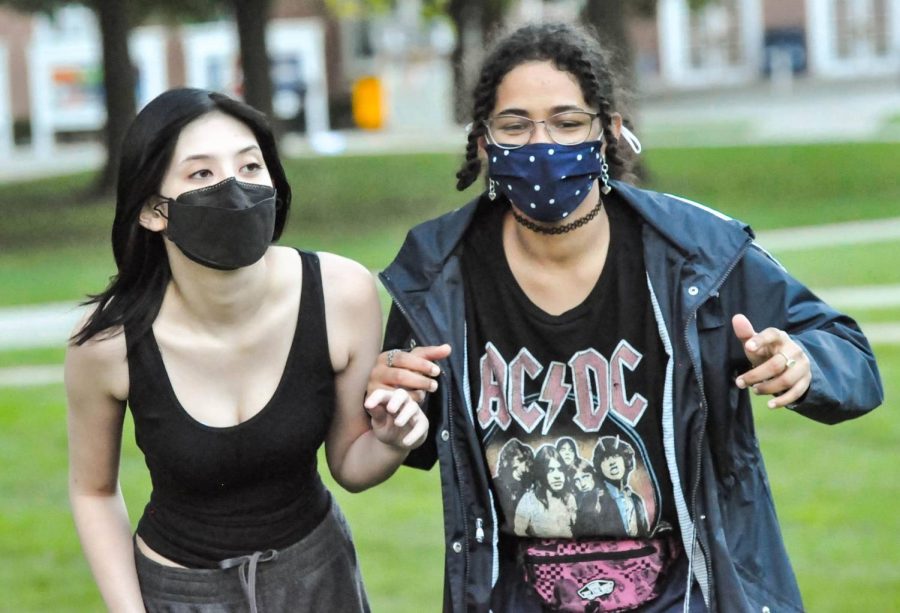Opinion | University COVID-19 policies prompt skepticism
Two students wear masks on the Main Quad while playing real life “Squid Games” on Oct. 19. Columnist Micky Horstman argues that the University Covid-19 policies pick favorites and prompt skepticism.
Oct 28, 2021
The University has a complex history of favoritism from the Governor’s office. Former Gov. Rod Blagojevich was imprisoned after a public corruption investigation showed, amongst other things, that he offered five University law school graduates jobs in exchange for the law school admitting an unqualified governor-backed applicant.
Pulitzer-prize-winning journalist Mark Konkol suggests that the University’s SHIELD testing program has received similar favoritism from Gov. J.B. Pritzker. Konkol spent the year questioning the legitimacy of the COVID-19 positivity rate and investigating how inaccurate testing data has been used to drive state-wide policy decisions.
The investigation implies some level of manipulation over SHIELD Illinois competitors who offered more affordable testing. By sorting Freedom of Information Act requests for government contracts and emails, Konkol claims Pritzker had some hand in helping SHIELD get bids for statewide testing.
It’s no secret that the University’s testing program has been a public relations success. However, most students don’t know that the campus required saliva testing months before they received FDA approval. Now that testing is optional on campus, the positivity rate is inaccurate and highly skewed, issues which Konkol cited in his initial investigation.
It is time for Illinois and this campus to rethink their COVID-19 mandates, as they are basing their public policy on skewed data. The positivity rate on October 2, 2021 was 0.15% and was based on the test results of fewer than 3,000 people, whereas October 2, 2020 saw a positivity rate of .017% based on testing from over 10,000 people.
Get The Daily Illini in your inbox!
The University isn’t testing to the capacity that inspires faith in a positivity rate, and the individuals testing are more likely to have a positive result as they are either non-vaccinated or motivated to get results because they may be showing symptoms or had a recent exposure.
Only the character of a person who may have been infected is determining whether they are voluntarily being tested.
Even so, results like these are being used to determine state-wide policy decisions. Decisions that have disproportionately affected small businesses and communities of color, while Illinois lags far behind the rest of the nation in COVID-19 recovery.
The state’s unemployment numbers are staggering because policies based on inaccurate data are preventing job recovery. In reality, the campus has no clue the actual rate of positivity or spread now that testing is no longer required — and the state never had a clue.
Students continue to suffer because of the COVID-19 policies in place on campus. Mental health facilities aren’t sufficient, most students have a hybrid schedule and the quality of in-person classes remains diminished. The campus required vaccinations, testing and masks, yet student life remains limited.
Most students on campus have experienced more online classes than in-person classes, and all for the same price.
People talk about the price of COVID-19 in many ways. The impact on the economy or decreased quality of education can seem superficial when compared to the cost of human lives. People tend to take offense to big corporations and government systems taking advantage of human suffering for profit. Too many lives have been lost to COVID-19 to be playing politics over this crisis.
How much money has the university made from selling its COVID-19 testing systems? How many contracts do they have? Where is the money going? None of this information is readily available.
Students were promised a return to normalcy, yet this semester has seen little improvement in decreasing the number of online classes, and the Safer Illinois app screening when entering buildings is inconsistent at best.
As the Fall Break approaches, many students are worried that the University will suspend in-person classes. By Halloween, the University isn’t required to prorate any tuition or board, so don’t expect another COVID-19 refund if classes go completely remote and the dorms shut down.
The mask mandate remains in effect for everyday students attending in-person classes. However, exceptions exist for students participating in the arts and athletics, so long as they are regularly tested. It’s good to see a return to normality in sports and the arts, but COVID-19 plays by different rules for members of the University community whose campus can profit from them.
How much longer will students be expected to tolerate the decline in educational practices under the guise of COVID-19? The fact that the University has turned such a formidable profit from the situation should find every student asking this question.
Micky is a junior in LAS.






